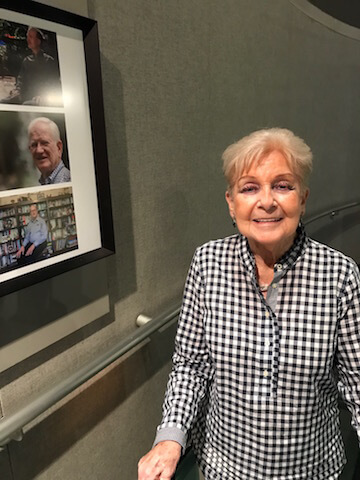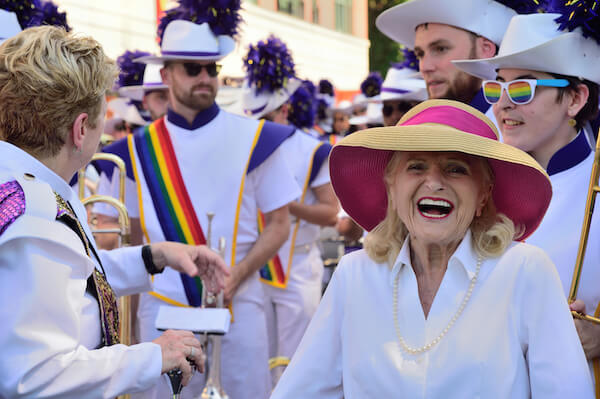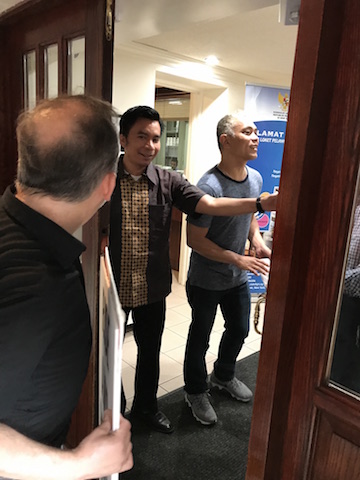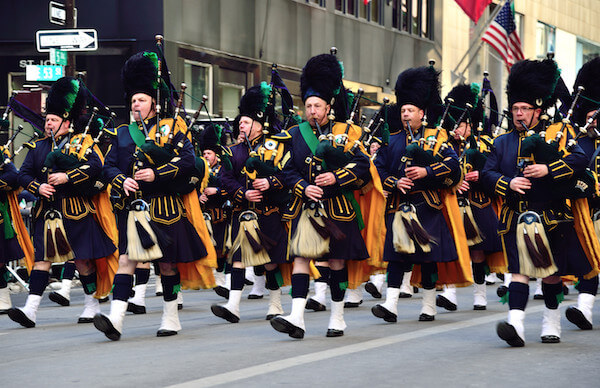Father John McNeill, a Catholic priest, moral theologian, and psychotherapist, whose groundbreaking “The Church and the Homosexual” in 1976 challenged the condemnation of gay love by Church dogma and scripture, died on September 22 in Fort Lauderdale after a long illness. He was 90. He is survived by his husband, Charles Chiarelli.
While Pope Francis was in the US talking about the “crisis” facing traditional family life, it is McNeill’s call for acceptance of same-sex love that is ascendant –– at least among American Catholics.
McNeill’s book was both a serious work of moral theology and a rallying cry for gay and lesbian Catholics to accept themselves and be embraced fully by their Church. He dismissed interpretations of the sin of Sodom as sodomy, citing Jesus’ own take on Sodom as a town that was inhospitable to outsiders.
His 1976 “The Church and the Homosexual” affirmed gay love, a challenge to orthodoxy for which he paid a price
Marianne Duddy-Burke, executive director of DignityUSA, the LGBT Catholic group, said in a written release, “John was really the first major prophet of the Catholic LGBT movement.”
In his book, published with official permission (imprimi potest) of his Jesuit superior after a delay of several years, McNeill wrote that “the Church’s attitude toward homosexuality is another example of structured social injustice, equally based in questionable interpretations of Scripture, prejudice, and blind adherence to merely human traditions, traditions which have been falsely interpreted as the law of nature and of God. In fact, as we have seen, it is the same age-old tradition of male control, domination, and oppression of women which underlies the oppression of the homosexual.”
McNeill’s book landed like a bomb on the rigid Catholic theological landscape and attracted worldwide attention. He appeared on the “The Today Show” and “Donahue” among many nationwide TV programs to publicize his thesis, reaching millions and provoking the Vatican, at the direction of Cardinal Joseph Ratzinger (later Pope Benedict XVI), to have him formally silenced –– forbidden to speak out publicly on the topic of homosexuality. McNeill accepted the silencing in the hopes that many other Catholic priests would come out to defend his writings, but that did not materialize.
One priest who did risk standing up for gay love was Father Bernárd Lynch, his colleague in the New York chapter of Dignity that McNeill co-founded in 1972 with the late Father Robert Carter, also a Jesuit. Speaking from his London home, Lynch said, “John McNeill deconstructed the Christian scriptures to say there is no justification in Holy Scripture for what is being done to gay people.” Lynch said that the word from inside the Vatican was that “the reason John was silenced and eventually expelled from the Jesuits was that he was giving homosexual people too much hope.”
Lynch explained, “They were telling us that Sodom was destroyed by homosexual sins of men against angels, but John showed how in fact it was the sin of inhospitality to strangers and how the Church is practicing the very sin of Sodom by being inhospitable. It changed the whole discourse in the Christian Church.”
Before meeting McNeill, Lynch said, “The sight of his book being reviewed did more for my mental health than all the shrinks I saw before or since.”
Lynch, also an out gay man, was recently expelled from his Irish order for speaking out against Church homophobia after a lifetime of service, including the largest AIDS ministry in New York in the depths of the epidemic during the 1980s.
Jeff Stone, secretary of Dignity/ New York, said, “I was with John on many occasions over the past 25 years and saw how profoundly he affected so many people, through his books, his retreats, his psychotherapy practice, and his public witness. He brought a message of hope and liberation to LGBT Catholics and others at a time when there were very few religious voices proclaiming that gay was good, gay was holy.”
In 1987, McNeill was expelled from his Jesuit order after breaking his silence in response to the Vatican’s 1986 “Letter on the Pastoral Care of Homosexual Persons,” an infamous and vicious anti-gay diatribe by Ratzinger that said, “Although the particular inclination of the homosexual person is not a sin, it is a more or less strong tendency toward an intrinsic moral evil; and thus the inclination itself must be seen as an objective disorder.”
Even more offensive was the letter’s blaming anti-gay violence on those working for LGBT civil rights, insisting that “the proper reaction to crimes committed against homosexual persons should not be to claim that the homosexual condition is not disordered. When such a claim is made and when homosexual activity is consequently condoned, or when civil legislation is introduced to protect behavior to which no one has any conceivable right, neither the Church nor society at large should be surprised when other distorted notions and practices gain ground, and irrational and violent reactions increase.”
That was too much for McNeill, and he spoke out forcefully against Ratzinger’s teaching.
McNeill’s expulsion from the Jesuits was followed by an order barring Dignity chapters from meeting in Catholic spaces. The New York chapter was thrown out of the Jesuit-run parish of St. Francis Xavier in Chelsea that had helped it grow to a congregation of 300 for Saturday night services. The group now meets in St. John’s Episcopal Church in Greenwich Village. (In the past week, a small ray of hope became visible in a New York Times feature about Xavier High School, next door to the church but unrelated to it, which now has a gay-straight alliance group — unusual for a Catholic high school.)
In addition to numerous awards from LGBT religious groups, McNeill was honored as a grand marshal of the New York LGBT Pride Parade in 1987.
While not formally laicized, McNeill was denied a Jesuit pension and made his living as a psychotherapist and through giving retreats. He authored numerous other books including “Taking a Chance on God” and “Freedom, Glorious Freedom,” which expanded on themes first explored in “The Church and the Homosexual.”
In his autobiography, “Both Feet Firmly Planted in Midair: My Spiritual Journey” in 1998, McNeill recounted his experience as a starving American prisoner of war at the age of 17 in Germany during World War II. Seeing his plight –– he was down to 90 pounds –– a Polish slave laborer risked death and tossed him a potato and made the sign of the cross. It was then that McNeill vowed to become a priest.
McNeill shared his life with Chiarelli for almost 50 years. In McNeill’s early appearances on TV defending his book, he acknowledged being “psychically gay” but was not open about his committed relationship. After the expulsion from the Jesuits, he opened up about it. The couple legally married in 2009.
“John’s courage and fortitude around the LGBT movement was enabled and ennobled long before he came to the forefront by his love for Charlie Chiarelli,” Lynch said. “John would not have the strength to do what he did the way he did it without Charlie to come home to throughout.”
John J. McNeill was born in Buffalo on September 2, 1925. He entered the Jesuits in 1948 and was ordained –– by the notoriously closeted gay Cardinal Francis Spellman of New York –– in 1959. He taught philosophy and moral theology at the Jesuit LeMoyne College in Syracuse and later at Woodstock College, which also had a Jesuit affiliation. McNeill’s involvement in activism against the Vietnam War moved him along the path of a more radical approach to gay activism. His brother Jesuit Daniel Berrigan was one of the leading peace activists of the era and later a member of the Woodstock Community of Jesuits upstate with McNeill and Carter.
I encountered McNeill as a new member of Dignity in 1975 (I left the group and the Church in 1982). He gave a talk to the membership based on his as yet unpublished book and I will never forget him starting out by saying, “First of all, no serious moral theologian considers masturbation a sin.” An audible sigh of relief rose up from the assembled.
McNeill actually put a heavy emphasis on Catholics needing to grow up into a mature faith and stop being dependent on what the hierarchy said. In accepting an award from the pro-gay New Ways Ministry in 2009, McNeill said, “One of the greatest beneficiaries of the fallibility of Church authorities has been the LGBT Catholic community. We came to realize early on that we could not accept and obey Church teaching on homosexuality without destroying ourselves physically, psychologically, and spirituality. Consequently, as a matter of survival we had to take distance from Church teaching, develop our freedom of conscience, and learn to hear what the Spirit of God is saying to us through our experience. The result has been that the LGBT community is leading the way to transform the Catholic Church into a Church of the Holy Spirit.”
When his persecutor Cardinal Ratzinger was elected pope in 2005, McNeill said it was the work of “the Holy Spirit” that would push more Catholics away from top-down governance and even trigger such reforms as women priests. But while Ratzinger was a divisive figure content with making his Church smaller if it were purer in doctrine, his leadership did not provoke any serious backlash in favor of reform. Many look to Pope Francis as a reformer, and he is slowly working to shake up the Curia that governs the Church from the Vatican, but even he has declared himself closed to women priests and to allowing the use of artificial contraception, much less to affirming gay love.
McNeill strongly advocated for women priests and equality. He once wrote, “At the heart of all homophobia is feminaphobia and the repression of the feminine. Gay men are seen as a threat to patriarchy because they are frequently in touch with and act in accord with the feminine dimension of themselves. It is clear that feminine and gay liberation are so intimately linked that gays should give full support to women’s liberation and vice versa.”
Irish gay activist Brendan Fay’s documentary on McNeill, “Taking a Chance on God,” tells his stirring life story. Fay hailed him on Facebook as “Gay priest, prophetic witness, healer, warm friend, teacher, bearer of hope and tenderness –– oh we will miss him.”
Fay is planning a memorial service in New York, date to be announced.
Out gay City Councilmember Daniel Dromm of Queens met McNeill at a Dignity meeting at the Woodstock Jesuit community in New York in 1974. In an email, Dromm wrote that despite all the adversity McNeill suffered at the hands of his own Church, he “remained kind, loving, and compassionate. History will eventually record John's theological viewpoint –– that gay sexuality is as sacred as heterosexuality –– was correct.”





































